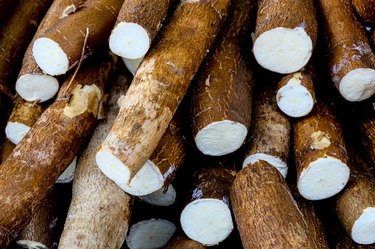
Loaded with potassium, choline and vitamin C, yuca has emerged as one of the most nutritious foods on earth. It's available in both sweet and bitter varieties and can be cooked in a multitude of ways. Its texture is similar to that of pumpkin. Also known as manioc or cassava, this root grows in South America, Africa and Asia. Despite its high carb content, it has a low glycemic index and makes a healthy addition to any diet.
Tip
When consumed in moderation, yuca is a healthy addition to any diet. It's rich in fiber and complex carbs and has a lower glycemic index than potatoes and parsnips.
Video of the Day
What Is Yuca?
You might have seen it on the store shelves, called yuca root, frozen cassava or yuca flour. This nutty-flavored starch has been used as an alternative to yams and potatoes for centuries. Most people have consumed this plant without even realizing it. Tapioca, one of the most popular starches worldwide, is actually made from cassava root.
Video of the Day
Even though the terms "yucca" and "yuca" are often used interchangeably, they're not one and the same. In fact, the two are unrelated species. Yuca root, or cassava root, is a delicious, healthy tuber that can replace potatoes in most dishes, while yuccas are perennial shrubs grown for decorative purposes.
Yuca root can be consumed ground into flour or used in cooked dishes. Since it contains no gluten, it's safe for those with celiac disease. Its flavor is similar to that of potatoes, but lighter.
Keep in mind that, because it may cause cyanide poisoning, raw yuca should never be consumed. A study published in the Journal of Analytical and Bioanalytical Techniques states that this plant is high in cyanogenic glycosides, a class of chemicals that has been linked to severe toxicity, digestive distress, shortness of breath, coma and even death.
Nutritional Value of Yuca Root
Along with rice and corn, yuca is one of the primary sources of carbs in the tropics. A single cup provides 330 calories, 78 grams of carbohydrates, 4 grams of fiber and 3 grams of protein, but only 1 gram of fat.
Yuca nutrition facts include large doses of vitamins A, C, thiamin, folate and niacin. One cup supplies 40 percent of the RDA of manganese, 11 percent of the RDA of potassium and 71 percent of the RDA of vitamin C.
Compared to potatoes, yuca root is higher in calories, protein and carbs. This makes it ideal for athletes, active individuals and people recovering from surgery or illnesses.
Due to its high vitamin C content, it supports immune function and fights oxidative stress. It's also an excellent source of B-complex vitamins, which are essential for brain function and metabolism. Potassium, one of the most abundant minerals in yuca, regulates blood pressure and heart rate while preventing electrolyte imbalances.
Read More: Yuca Root Health Benefits
Potential Health Benefits
If you're on a diet, you may wonder whether yuca root is a good choice. While eating too much of it can hamper your progress, you can consume it in moderation. An occasional serving of yuca is unlikely to cause weight gain.
This starchy tuber boasts impressive amounts of vitamins and minerals that support optimum health. Vitamin C, one of its key nutrients, stimulates collagen products and slows the aging process. According to Oxidative Medicine and Cellular Longevity, it also protects against oxidative stress and enhances your body's natural defenses.
Furthermore, yuca has a low glycemic index (GI) of only 46, according to Full Plate Living. By comparison, the glycemic index of parsnips is 97. Potatoes have a GI of 72 to 88 depending on the cooking method used. This makes yuca root suitable for diabetics. Plus, its high fiber content may help prevent blood sugar spikes and improve digestive health.
Both fresh and frozen yuca can be used in a variety of recipes. You can bake it, roast it, or mash it just like you do with potatoes. If you're sensitive or allergic to gluten, consider replacing grain flour with cassava flour.
- Gardening Know How: Caring for Yucca - Tips for Landscaping With Yuccas Outdoors
- Intechopen: A Review of Cyanogenic Glycosides in Edible Plants
- World Health Organization: Natural Toxins in Food
- SELF Nutrition Data: Raw Cassava
- Full Plate Living: Glycemic Index (GI) Guidelines for a Plant-based Diet
- Hindawi: Influence of Vitamin C Supplementation on Oxidative Stress and Neutrophil Inflammatory Response in Acute and Regular Exercise
- OMICS International: Determination of Cyanogenic Compounds Content in Transgenic Acyanogenic Kenyan Cassava (Manihot esculenta Crantz) Genotypes
- NCBI: Bioavailability of Cyanide After Consumption of a Single Meal of Foods Containing High Levels of Cyanogenic Glycosides
- Organic Facts: 10 Wonderful Benefits Of Yucca Root
- NIH.gov: Vitamin C
- Cookpad: Cassava Recipes